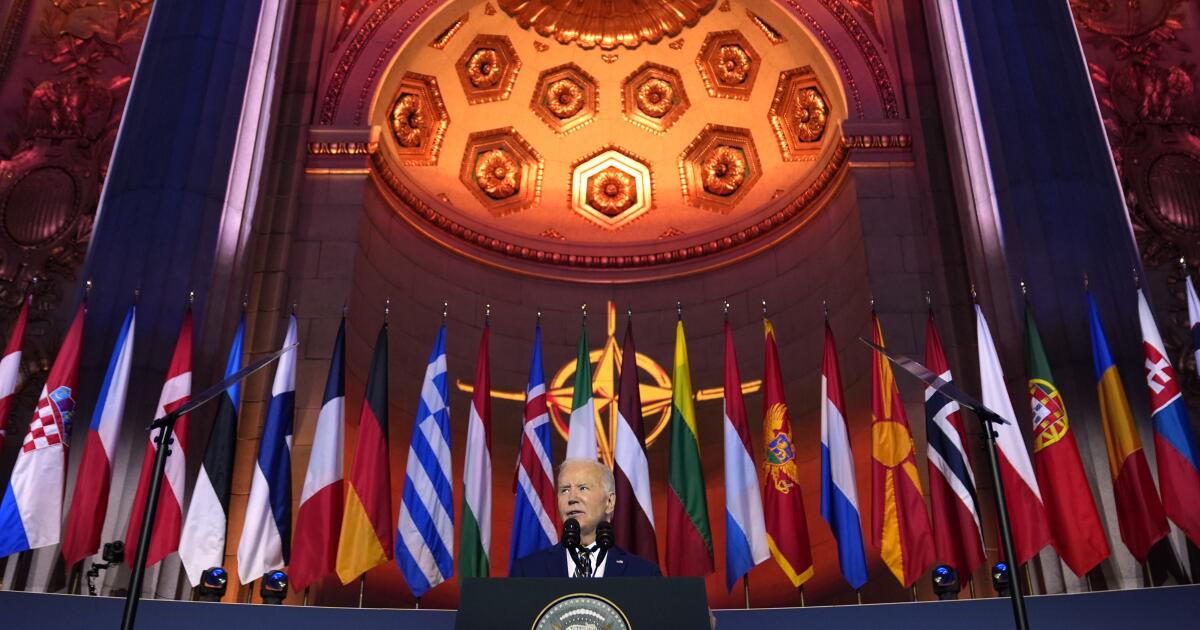WASHINGTON —
The United States and its NATO allies will give Ukraine new air defense systems, Europe-based military training and other equipment to bolster its desperate fight against Russia more than two years into their bloody war.
But Ukraine will not — critically — get membership in the transatlantic alliance.
As leaders of the 32 states that form NATO convened here for the group’s 75th anniversary, U.S. officials said Ukraine is instead being offered a “bridge” to membership — an unclear path that delays any consideration of an application to join until after the war ends.
Ukraine sees belonging to NATO as protection against a far larger and better-armed aggressor.
But many within the alliance fear an escalation with Russia, and say bringing Ukraine into the fold now would place NATO countries into direct conflict with Moscow.
Ukrainian President Volodymyr Zelensky is disappointed, but was warned by U.S. officials not to make an angry public display of his frustration, as he did at last year’s summit.
Instead, he made a forceful pitch for urgent, sustained support from the West. In Washington for the summit, Zelensky pointedly chose a Republican audience for a major speech and repeatedly alluded to the possibility of former President Trump winning the November election.
Trump, along with a number of Republicans, has voiced skepticism about continued aid to the embattled nation.
“It’s time to … make strong decisions, to act and not to wait for November or any other months,” Zelensky said Tuesday night at the Reagan Institute, where he was introduced by Senate Minority Leader Mitch McConnell (R-Ky.).
“To this end, we must be strong and uncompromising all together … all America. Uncompromising in defending democracy, uncompromising against [Russian President Vladimir] Putin and his coterie, uncompromising to every possible terror.”
Zelensky renewed requests that Ukraine be allowed to use U.S.-supplied weapons to attack Russia on its territory, something the Biden administration has largely forbidden because it could be seen as a provocation.
“How much longer can Putin last?” Zelensky said. “The answer to this question is right here in Washington.”
President Biden announced the new assistance for Ukraine as he opened the summit. His appearances this week are under intense scrutiny as turmoil swirls in the Democratic Party over whether the 81-year-old president should continue to run for reelection. He has rejected calls that he withdraw from the race.
Biden described the supply of new air-defense systems, about a dozen in all, as a “historic donation,” although it was relatively modest in comparison to Russia’s routine deadly barrages launched against Ukrainian cities, including numerous civilian targets, such as the children’s hospital in Kyiv attacked on Monday.
Secretary of State Antony J. Blinken, speaking on the sidelines of the NATO summit, insisted that Ukraine’s future lies in NATO. Membership would also require Kyiv to adopt numerous anti-corruption, transparency and good-governance measures.
Ukraine’s path to NATO is “irreversible,” Blinken said.
Sensitivities over Ukraine joining NATO are so high that even the phrasing of a statement about a pathway to membership took months of wrangling in Washington and various European capitals. But enough consensus has been reached to include the word “irreversible” to characterize Ukraine’s participation in NATO, according to people familiar with the process.
“I would have predicted by now that there would have been a lot more wobbliness when it comes for support for Ukraine, but other than the Slovaks and the Hungarians, everyone is staying the course,” said Charles Kupchan, a senior fellow at the Council on Foreign Relations.

